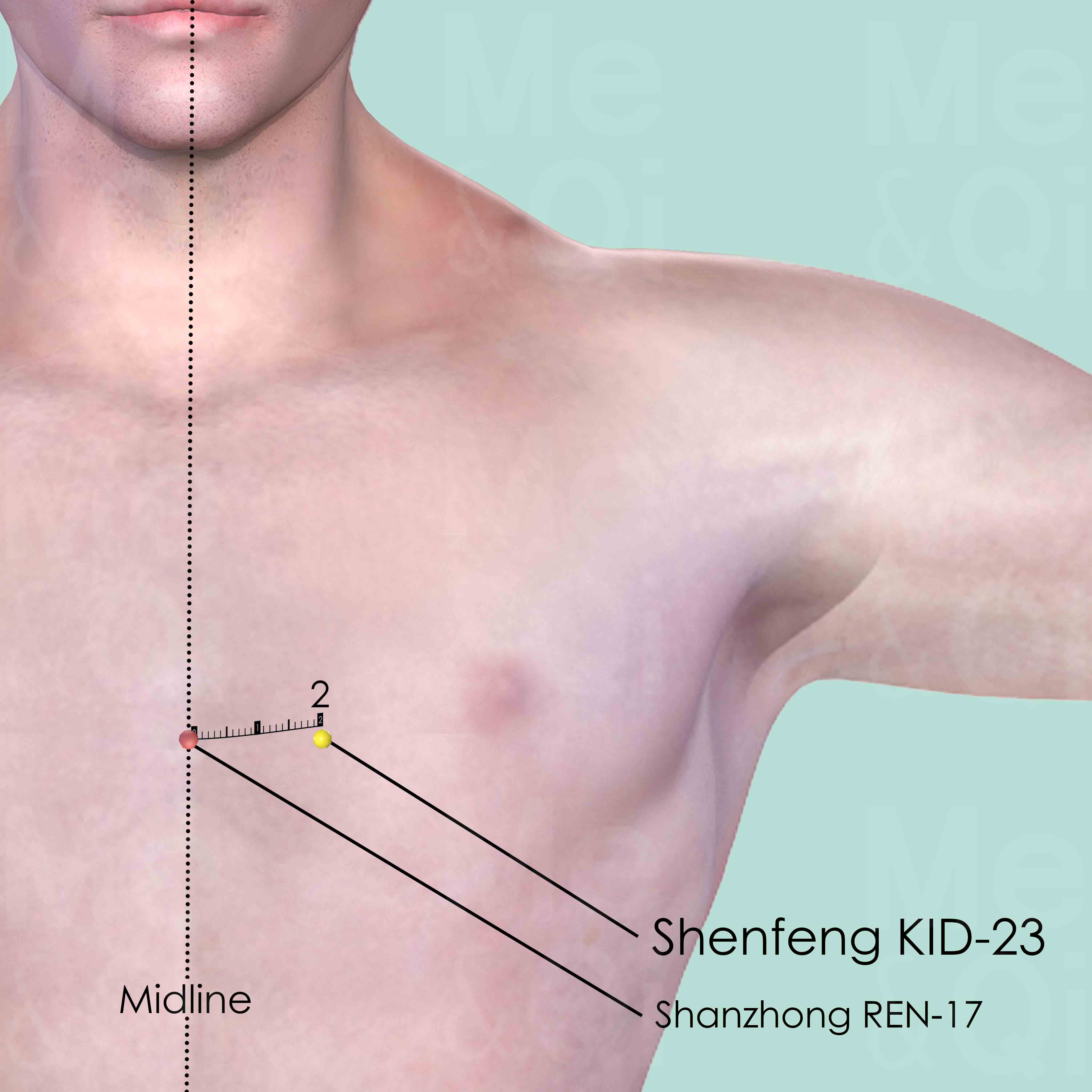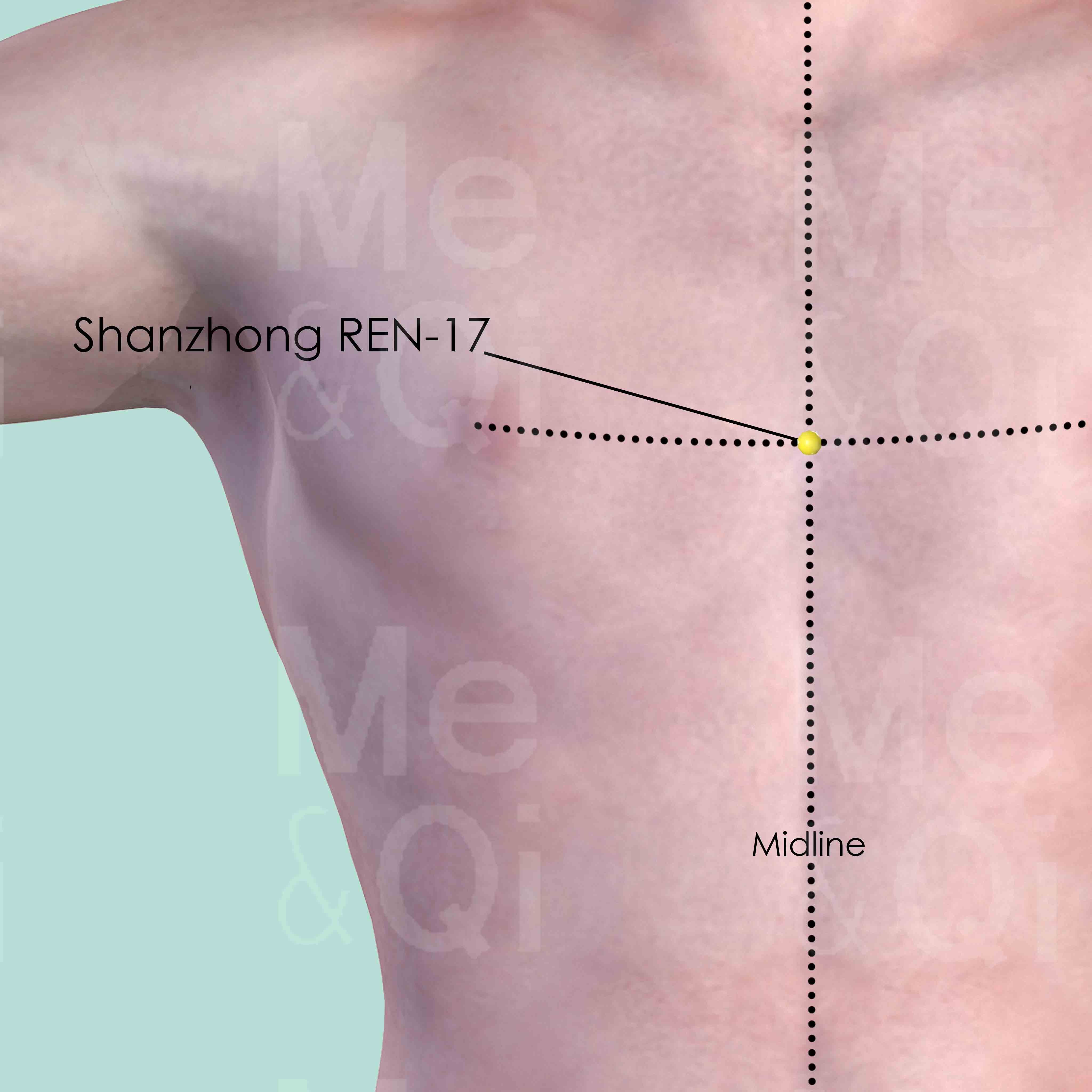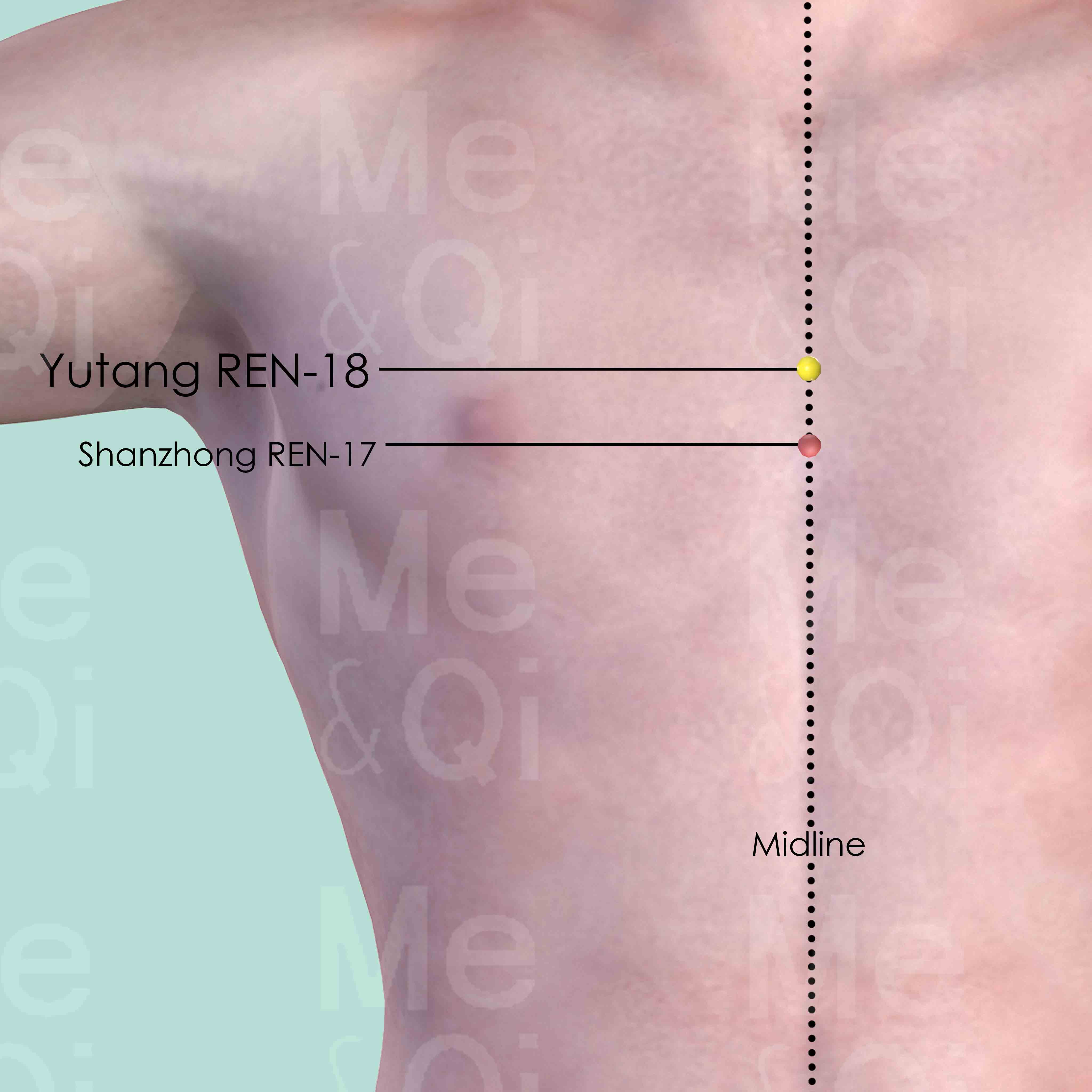Breast Engorgementaccording to TCM
Symptom family: Breastfeeding Conditions
Did you mean? Clogged Milk Ducts
Root Causes of Breast Engorgement in TCM
Explore below more details about what might cause Breast engorgement according to TCM.
- By Syndrome
- By Organ
- Qi Stagnation
- Blood Stasis
- Heat
- Phlegm
- Qi Rebellion
- Blood Deficiency
- View More Causes
- Liver
- Stomach
- Spleen
Qi Stagnation
Qi Stagnation in TCM is like having a traffic jam in your body's energy system. Qi, the vital life force that flows through your body, is supposed to move smoothly to maintain health and balance. But with Qi Stagnation, this flow gets blocked or slowed down, like cars stuck on a highway. This can lead to symptoms like feeling stressed, emotional mood swings, and physical discomfort, often described as a feeling of fullness or tightness, especially in the chest or abdomen. It's as though the body's internal energy circulation is disrupted, causing various issues. TCM sees this as an energy flow problem, different from modern medicine's focus on specific physiological processes.... see more
Qi Stagnation Patterns That Can Lead to Breast Engorgement
Common Symptoms: Irritability Mood Swings Depression Irregular Periods Abdominal Pain Menstrual Cramps Dark Menstrual Blood Pre Menstrual Tension
| Pattern Name | Relevant Symptoms | Relevant Formulas |
|---|---|---|
| Qi And Blood Stagnation | Breast distention, Chest distension, Chest pain, Stabbing fixed pain, Dark face, Purple lips, Purple nails, Irritability, Mood swings, Depression, Mottled skin, Foot edema, Abdominal masses, Melena black tarry stool, Menstrual cramps, Amenorrhea, Dark menstrual clots, Dark menstrual blood, Prolonged lochia, Irregular periods... see more | Ge Xia Zhu Yu Tang | Tao Hong Si Wu Tang | Shao Fu Zhu Yu Tang | Wu Yao Tang | Jia Wei Xiao Yao San | Wei Jing Tang | Xiao Yao San |
| Liver Qi Stagnation | Breast distention, breast engorgement, Hypochondriac distention, Chest distension, Upper abdominal distension, Abdominal distention, Sighing, Melancholia, Depression, Mood swings, Irregular periods, Globus sensation, Pre menstrual breast distension, Pre menstrual tension, Anxiety, Anger... see more | Wu Yao Tang | Gua Lou San | Xiao Yao San | Xia Ru Yong Quan San | Yue Ju Wan |
| Qi Stagnation | Breast distention, General fullness, Moving pain, Depression, Irritability, Mood swings, Sighing | Xiao Yao San | Chai Hu Shu Gan San | Si Mo Tang | Qi Ge San |
| Stagnant Liver Qi turning into Fire | Breast distention, Hypochondriac distention, Upper abdominal distension, Feeling of oppression of the chest, Irritability, Melancholia, Depression, Mood swings, Globus sensation, Feeling hot, Flushed face, Thirst, Anger, Pre menstrual tension, Irregular periods, Pre menstrual breast distension, Excessive menstruation... see more | Dan Zhi Xiao Yao San | Long Dan Xie Gan Tang |
Blood Stasis
Blood Stasis in TCM is a concept where the blood flow in the body is not as smooth or efficient as it should be. Imagine a river that's supposed to flow freely, but instead, it's getting blocked or moving too slowly in some parts. This can lead to various health issues, like pain that feels sharp or stabbing, dark bruises, and a complexion that looks purplish. TCM believes that good health relies on the smooth and vibrant flow of Qi and blood throughout the body, so when blood gets stuck, it's like a traffic jam in your body, leading to discomfort or health problems.... see more
Blood Stasis Patterns That Can Lead to Breast Engorgement
Common Symptoms: Irritability Abdominal Masses Menstrual Cramps Amenorrhea Dark Menstrual Clots Dark Menstrual Blood Prolonged Lochia Irregular Periods
| Pattern Name | Relevant Symptoms | Relevant Formulas |
|---|---|---|
| Qi And Blood Stagnation | Breast distention, Chest distension, Chest pain, Stabbing fixed pain, Dark face, Purple lips, Purple nails, Irritability, Mood swings, Depression, Mottled skin, Foot edema, Abdominal masses, Melena black tarry stool, Menstrual cramps, Amenorrhea, Dark menstrual clots, Dark menstrual blood, Prolonged lochia, Irregular periods... see more | Ge Xia Zhu Yu Tang | Tao Hong Si Wu Tang | Shao Fu Zhu Yu Tang | Wu Yao Tang | Jia Wei Xiao Yao San | Wei Jing Tang | Xiao Yao San |
| Blood Stagnation in the Directing and Penetrating Vessels | Breast distention, Irregular periods, Brown vaginal discharge, Dark menstrual clots, Menstrual cramps, Dark menstrual blood, Prolonged lochia, Lower abdominal pain, Umbilical pain, Breast engorgement, Breast pain... see more | Gui Zhi Fu Ling Wan |
Heat
In TCM "Heat" signifies an excess of Yang energy, leading to an imbalance where heat predominates over the body's cool Yin aspects. This condition is metaphorically akin to an internal over-heating. Symptoms indicative of Heat can include feelings of warmth, fever, sweating, irritability, red face, thirst with a preference for cold drinks, and a rapid pulse. The tongue may appear red with a yellow coating. Unlike the common interpretation of heat in terms of temperature, in TCM, it represents a state of hyperactivity or inflammation in the body.... see more
Heat Patterns That Can Lead to Breast Engorgement
Common Symptoms: Headaches Thirst Eye Hyperemia Constipation Flushed Face Toothache Stomatitis Periodontitis
| Pattern Name | Relevant Symptoms | Relevant Formulas |
|---|---|---|
| Stagnant Liver Qi turning into Fire | Breast distention, Hypochondriac distention, Upper abdominal distension, Feeling of oppression of the chest, Irritability, Melancholia, Depression, Mood swings, Globus sensation, Feeling hot, Flushed face, Thirst, Anger, Pre menstrual tension, Irregular periods, Pre menstrual breast distension, Excessive menstruation... see more | Dan Zhi Xiao Yao San | Long Dan Xie Gan Tang |
| Stomach Fire or Stomach Heat | Breast distention, breast engorgement, Toothache, Headaches, Stomatitis, Periodontitis, Glossitis, Trigeminal neuralgia, Diabetes, Viral myocarditis, Breast lumps, Breast hardness... see more | Gua Lou San |
Phlegm
In TCM "Phlegm" as a pattern of disharmony is a complex concept that extends beyond the physical manifestation of mucus. It represents a pathological factor that can disrupt the flow of Qi (vital energy) and blood, leading to various health issues. Phlegm in TCM is seen as a sticky, turbid substance arising from the body's inability to metabolize fluids properly, often due to a dysfunction of the spleen. It's not only associated with respiratory problems like cough and congestion but also with systemic issues. Symptoms can include a feeling of heaviness, mental cloudiness, dizziness, and in some cases, the formation of lumps or masses. Phlegm can even be "invisible," contributing to emotional disturbances like depression or stress. ... see more
Phlegm Patterns That Can Lead to Breast Engorgement
| Pattern Name | Relevant Symptoms | Relevant Formulas |
|---|---|---|
| Phlegm | Breast distention, Feeling of oppression of the chest, Head fog, Dizziness | Yue Ju Wan | Wen Dan Tang | Ban Xia Hou Pu Tang |
Qi Rebellion
Rebellious Qi in TCM is a bit like having a rebel inside your body. Qi, which is the vital energy flowing through your body, is supposed to move in certain directions to keep everything in balance and working well. But with Rebellious Qi, this energy decides to go the opposite way. Think of it like a river flowing upstream instead of downstream. This can cause various issues like heartburn, coughing, or even headaches. It's as if the body's natural flow is disrupted, creating a kind of internal chaos. TCM focuses on correcting this flow, restoring order and balance.... see more
Qi Rebellion Patterns That Can Lead to Breast Engorgement
| Pattern Name | Relevant Symptoms | Relevant Formulas |
|---|---|---|
| Rebellious Liver Qi | Breast distention, Hypochondriac distention, Upper abdominal distension, Hiccups, Sighing, Nausea or vomiting, Belching, Stomach churning, Irritability, Breast engorgement, Headaches, Dizziness... see more | Chai Hu Shu Gan San | Si Ni San |
Blood Deficiency
Blood Deficiency in TCM is like when your body's tank runs low on the vital energy that blood provides. It's not exactly the same as anemia in modern medicine, which is about having too few red blood cells. Instead, Blood Deficiency in TCM is about your body not having enough of the life-giving qualities that blood brings, like nourishment and moisture. This can make you feel tired, look pale, and even feel dizzy or have blurry vision. It's like a garden not getting enough water to stay lush and vibrant. TCM sees this as an imbalance where the body isn't being nourished as it should be, impacting overall health and well-being.... see more
Blood Deficiency Patterns That Can Lead to Breast Engorgement
| Pattern Name | Relevant Symptoms | Relevant Formulas |
|---|---|---|
| Blood Deficiency with disharmony of Liver and Spleen | Breast distention, Chest distension, Chest pain, Anemia, Dizziness, Headaches, Dry mouth, Dry throat, Lack of appetite, Irregular periods, Leukorrhea... see more | Xiao Yao San |
Liver
In TCM the Liver is viewed as the organ responsible for the smooth flow of Qi, Blood, and emotions throughout the body. It plays a key role in regulating mood, storing blood, supporting digestion, and ensuring the health of tendons and eyes. When the Liver malfunctions or is imbalanced in TCM, it can lead to a range of issues such as irritability, mood swings, menstrual irregularities, eye problems, and muscular stiffness or pain. A malfunctioning Liver in TCM reflects not only physical disturbances but also emotional and mental disharmony, emphasizing the holistic approach of TCM in addressing health and wellness.... see more
Liver Patterns That Can Lead to Breast Engorgement
Common Symptoms: Headaches Hypochondriac Distention Upper Abdominal Distension Irregular Periods Irritability Dizziness Chest Distension Sighing
| Pattern Name | Relevant Symptoms | Relevant Formulas |
|---|---|---|
| Liver Qi Stagnation | Breast distention, breast engorgement, Hypochondriac distention, Chest distension, Upper abdominal distension, Abdominal distention, Sighing, Melancholia, Depression, Mood swings, Irregular periods, Globus sensation, Pre menstrual breast distension, Pre menstrual tension, Anxiety, Anger... see more | Wu Yao Tang | Gua Lou San | Xiao Yao San | Xia Ru Yong Quan San | Yue Ju Wan |
| Rebellious Liver Qi | Breast distention, Hypochondriac distention, Upper abdominal distension, Hiccups, Sighing, Nausea or vomiting, Belching, Stomach churning, Irritability, Breast engorgement, Headaches, Dizziness... see more | Chai Hu Shu Gan San | Si Ni San |
| Stagnant Liver Qi turning into Fire | Breast distention, Hypochondriac distention, Upper abdominal distension, Feeling of oppression of the chest, Irritability, Melancholia, Depression, Mood swings, Globus sensation, Feeling hot, Flushed face, Thirst, Anger, Pre menstrual tension, Irregular periods, Pre menstrual breast distension, Excessive menstruation... see more | Dan Zhi Xiao Yao San | Long Dan Xie Gan Tang |
| Blood Deficiency with disharmony of Liver and Spleen | Breast distention, Chest distension, Chest pain, Anemia, Dizziness, Headaches, Dry mouth, Dry throat, Lack of appetite, Irregular periods, Leukorrhea... see more | Xiao Yao San |
Stomach
In TCM the Stomach is regarded as the "sea of nourishment," pivotal for digesting food and transforming it into Qi and blood. It works closely with the Spleen to distribute these essential nutrients throughout the body. When the Stomach is out of balance or malfunctions in TCM, it often leads to digestive problems such as bloating, nausea, vomiting, poor appetite, or a feeling of fullness. There may also be issues like acid reflux or a sour taste in the mouth. Emotionally, an imbalanced Stomach can contribute to excessive worry and overthinking, reflecting the TCM belief that physical and emotional well-being are deeply interconnected.... see more
Stomach Patterns That Can Lead to Breast Engorgement
| Pattern Name | Relevant Symptoms | Relevant Formulas |
|---|---|---|
| Stomach Fire or Stomach Heat | Breast distention, breast engorgement, Toothache, Headaches, Stomatitis, Periodontitis, Glossitis, Trigeminal neuralgia, Diabetes, Viral myocarditis, Breast lumps, Breast hardness... see more | Gua Lou San |
Spleen
In TCM the Spleen plays a vital role in digestion and transformation, converting food into energy and nutrients, and overseeing the distribution of Qi and Blood. It's also crucial in maintaining the health of muscles and limbs and ensuring the blood remains within the vessels. When the Spleen malfunctions in TCM, it can lead to a variety of issues such as digestive disorders, fatigue, weak muscles, bloating, and a feeling of heaviness. It can also cause a pale complexion, poor appetite, and a tendency to bruise easily. Emotionally, a Spleen imbalance is often associated with excessive worry or overthinking, reflecting its role in the interplay between physical and mental health.... see more
Spleen Patterns That Can Lead to Breast Engorgement
| Pattern Name | Relevant Symptoms | Relevant Formulas |
|---|---|---|
| Blood Deficiency with disharmony of Liver and Spleen | Breast distention, Chest distension, Chest pain, Anemia, Dizziness, Headaches, Dry mouth, Dry throat, Lack of appetite, Irregular periods, Leukorrhea... see more | Xiao Yao San |
TCM Herbal Formulas for Breast Engorgement
Explore below some TCM herbal formulas used to address breast engorgement, organized by cause and by formula type.
- By Cause
- By Formula Type
- Qi Stagnation
- Blood Stasis
- Heat
- Phlegm
- Qi Rebellion
- Blood Deficiency
- View More Causes
- Formulas that promote qi movement
- Formulas that invigorate blood and dispel blood stagnation
- Formulas that harmonize liver-Spleen
- Formulas that clear internal abscesses and sores
- Formulas that tonify blood
- Formulas that clear heat and resolve toxicity
- Formulas that dry dampness and transform phlegm
- Formulas that clear liver-Heat
- Formulas that clear heat from the organs
Top Formula for Qi Stagnation:
Xiao Yao San
Suitable for Qi Stagnation patterns that may cause breast engorgement, such as Qi And Blood Stagnation or Liver Qi Stagnation
Learn moreAll Formulas Recommended for Breast Engorgement Caused by Qi Stagnation
| Formula | Patterns Suitable For |
|---|---|
| Xiao Yao San | Qi And Blood Stagnation, Liver Qi Stagnation, Qi Stagnation |
| Wu Yao Tang | Qi And Blood Stagnation, Liver Qi Stagnation |
| Gua Lou San | Liver Qi Stagnation |
| Yue Ju Wan | Liver Qi Stagnation |
| Chai Hu Shu Gan San | Qi Stagnation |
| Ge Xia Zhu Yu Tang | Qi And Blood Stagnation |
| Tao Hong Si Wu Tang | Qi And Blood Stagnation |
| Shao Fu Zhu Yu Tang | Qi And Blood Stagnation |
| Jia Wei Xiao Yao San | Qi And Blood Stagnation |
| Wei Jing Tang | Qi And Blood Stagnation |
| Xia Ru Yong Quan San | Liver Qi Stagnation |
| Si Mo Tang | Qi Stagnation |
| Qi Ge San | Qi Stagnation |
| Dan Zhi Xiao Yao San | Stagnant Liver Qi turning into Fire |
| Long Dan Xie Gan Tang | Stagnant Liver Qi turning into Fire |
Top Formula for Blood Stasis:
Xiao Yao San
Suitable for Blood Stasis patterns that may cause breast engorgement, such as Qi And Blood Stagnation
Learn moreAll Formulas Recommended for Breast Engorgement Caused by Blood Stasis
| Formula | Patterns Suitable For |
|---|---|
| Xiao Yao San | Qi And Blood Stagnation |
| Wu Yao Tang | Qi And Blood Stagnation |
| Ge Xia Zhu Yu Tang | Qi And Blood Stagnation |
| Tao Hong Si Wu Tang | Qi And Blood Stagnation |
| Shao Fu Zhu Yu Tang | Qi And Blood Stagnation |
| Jia Wei Xiao Yao San | Qi And Blood Stagnation |
| Wei Jing Tang | Qi And Blood Stagnation |
| Gui Zhi Fu Ling Wan | Blood Stagnation in the Directing and Penetrating Vessels |
Top Formula for Heat:
Gua Lou San
Suitable for Heat patterns that may cause breast engorgement, such as Stomach Fire or Stomach Heat
Learn moreAll Formulas Recommended for Breast Engorgement Caused by Heat
| Formula | Patterns Suitable For |
|---|---|
| Gua Lou San | Stomach Fire or Stomach Heat |
| Dan Zhi Xiao Yao San | Stagnant Liver Qi turning into Fire |
| Long Dan Xie Gan Tang | Stagnant Liver Qi turning into Fire |
Top Formula for Phlegm:
Yue Ju Wan
Suitable for Phlegm patterns that may cause breast engorgement, such as Phlegm
Learn moreAll Formulas Recommended for Breast Engorgement Caused by Phlegm
| Formula | Patterns Suitable For |
|---|---|
| Yue Ju Wan | Phlegm |
| Wen Dan Tang | Phlegm |
| Ban Xia Hou Pu Tang | Phlegm |
Top Formula for Qi Rebellion:
Chai Hu Shu Gan San
Suitable for Qi Rebellion patterns that may cause breast engorgement, such as Rebellious Liver Qi
Learn moreAll Formulas Recommended for Breast Engorgement Caused by Qi Rebellion
| Formula | Patterns Suitable For |
|---|---|
| Chai Hu Shu Gan San | Rebellious Liver Qi |
| Si Ni San | Rebellious Liver Qi |
Top Formula for Blood Deficiency:
Xiao Yao San
Suitable for Blood Deficiency patterns that may cause breast engorgement, such as Blood Deficiency with disharmony of Liver and Spleen
Learn moreFormulas that promote Qi movement
These formulas are suitable for some breast engorgement-causing patterns like Qi And Blood Stagnation or Liver Qi Stagnation.
One such formula is Wu Yao Tang, with lindera root as a key herb.
Other formulas of this category are listed in the table below.
All "formulas that promote qi movement" recommended for breast engorgement
| Formula | Patterns Suitable For (if applicable) |
|---|---|
| Wu Yao Tang | Qi And Blood Stagnation, Liver Qi Stagnation |
| Yue Ju Wan | Liver Qi Stagnation, Phlegm |
| Chai Hu Shu Gan San | Qi Stagnation, Rebellious Liver Qi |
| Ban Xia Hou Pu Tang | Phlegm |
| Si Mo Tang | Qi Stagnation |
| Qi Ge San | Qi Stagnation |
Formulas that harmonize Liver-Spleen
These formulas are suitable for some breast engorgement-causing patterns like Qi And Blood Stagnation or Liver Qi Stagnation.
One such formula is Xiao Yao San, with bupleurum root as a key herb.
Other formulas of this category are listed in the table below.
All "formulas that harmonize liver-Spleen" recommended for breast engorgement
| Formula | Patterns Suitable For (if applicable) |
|---|---|
| Xiao Yao San | Liver Qi Stagnation, Qi And Blood Stagnation, Qi Stagnation, Blood Deficiency with disharmony of Liver and Spleen... see more |
| Jia Wei Xiao Yao San | Qi And Blood Stagnation |
| Si Ni San | Rebellious Liver Qi |
Formulas that invigorate Blood and dispel Blood Stagnation
These formulas are suitable for some breast engorgement-causing patterns like Qi And Blood Stagnation.
One such formula is Ge Xia Zhu Yu Tang, with szechuan lovage root as a key herb.
Other formulas of this category are listed in the table below.
All "formulas that invigorate blood and dispel blood stagnation" recommended for breast engorgement
| Formula | Patterns Suitable For (if applicable) |
|---|---|
| Ge Xia Zhu Yu Tang | Qi And Blood Stagnation |
| Shao Fu Zhu Yu Tang | Qi And Blood Stagnation |
| Gui Zhi Fu Ling Wan | Blood Stagnation in the Directing and Penetrating Vessels |
| Xia Ru Yong Quan San | Liver Qi Stagnation |
Formulas that clear internal abscesses and sores
These formulas are suitable for some breast engorgement-causing patterns like Jealous Breast (Du Ru) or Blow Breast (Chui Ru).
One such formula is Tuo Li Xiao Du San, with milkvetch root as a key herb.
Other formulas of this category are listed in the table below.
All "formulas that clear internal abscesses and sores" recommended for breast engorgement
| Formula | Patterns Suitable For (if applicable) |
|---|---|
| Tuo Li Xiao Du San | Jealous Breast (Du Ru), Blow Breast (Chui Ru) |
| Wei Jing Tang | Qi And Blood Stagnation |
Formulas that clear Heat and resolve toxicity
These formulas are suitable for some breast engorgement-causing patterns like Liver Qi Stagnation or Stomach Fire or Stomach Heat.
One such formula is Gua Lou San, with snake gourd as a key herb.
Formulas that tonify Blood
These formulas are suitable for some breast engorgement-causing patterns like Qi And Blood Stagnation.
One such formula is Tao Hong Si Wu Tang, with peach kernel as a key herb.
Formulas that dry Dampness and transform Phlegm
These formulas are suitable for some breast engorgement-causing patterns like Phlegm.
One such formula is Wen Dan Tang, with crow-dipper rhizome as a key herb.
Formulas that clear Liver-Heat
These formulas are suitable for some breast engorgement-causing patterns like Stagnant Liver Qi turning into Fire.
One such formula is Dan Zhi Xiao Yao San, with mudan peony bark as a key herb.
Formulas that clear Heat from the Organs
These formulas are suitable for some breast engorgement-causing patterns like Stagnant Liver Qi turning into Fire.
One such formula is Long Dan Xie Gan Tang, with chinese gentian as a key herb.
Acupoints for Breast Engorgement
Explore below some acupoints used to address breast engorgement, organized by meridian.
- By Meridian
- Kidney Channel
- Gall Bladder Channel
- Liver Channel
- Directing Vessel
- Bladder Channel
- Stomach Channel
- Spleen Channel
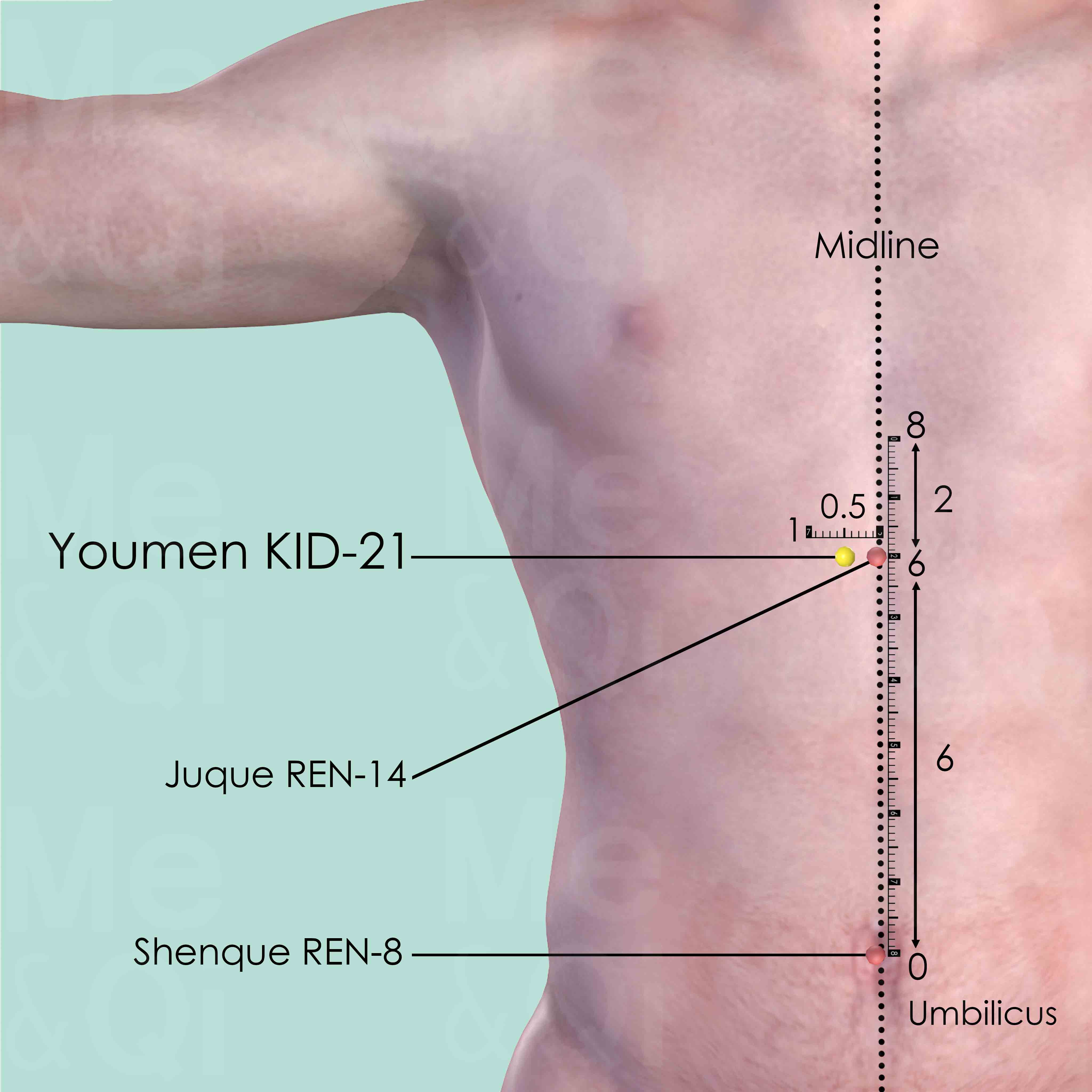
Youmen KID-21
6 cun above the umbilicus and 2 cun below the sternocostal angle, 0.5 cun lateral to the anterior midline.
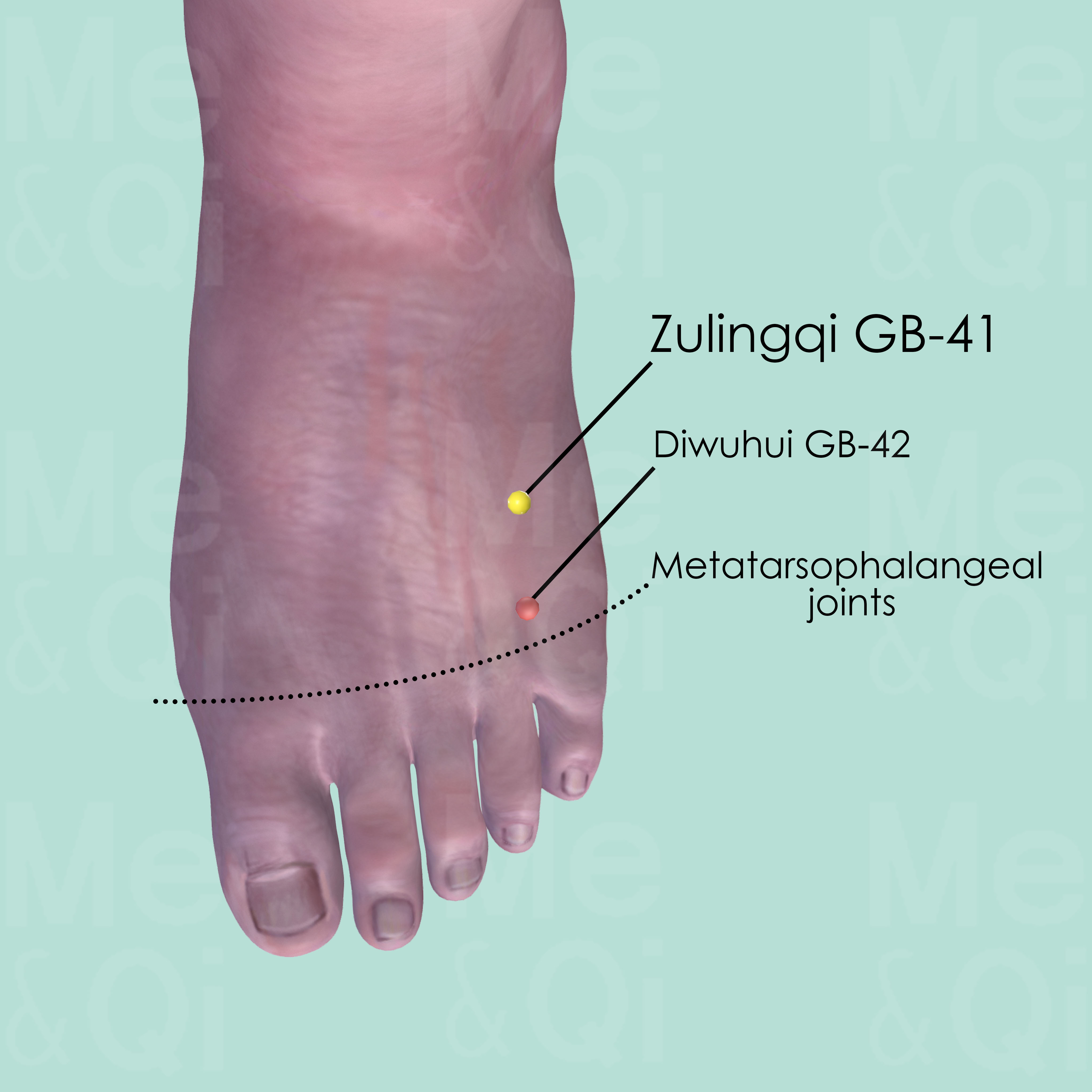
Zulingqi GB-41
In the depression distal to the junction of the 4th and 5th metatarsal bones, on the lateral side of the tendon of extensor digitorum longus muscle of the foot.
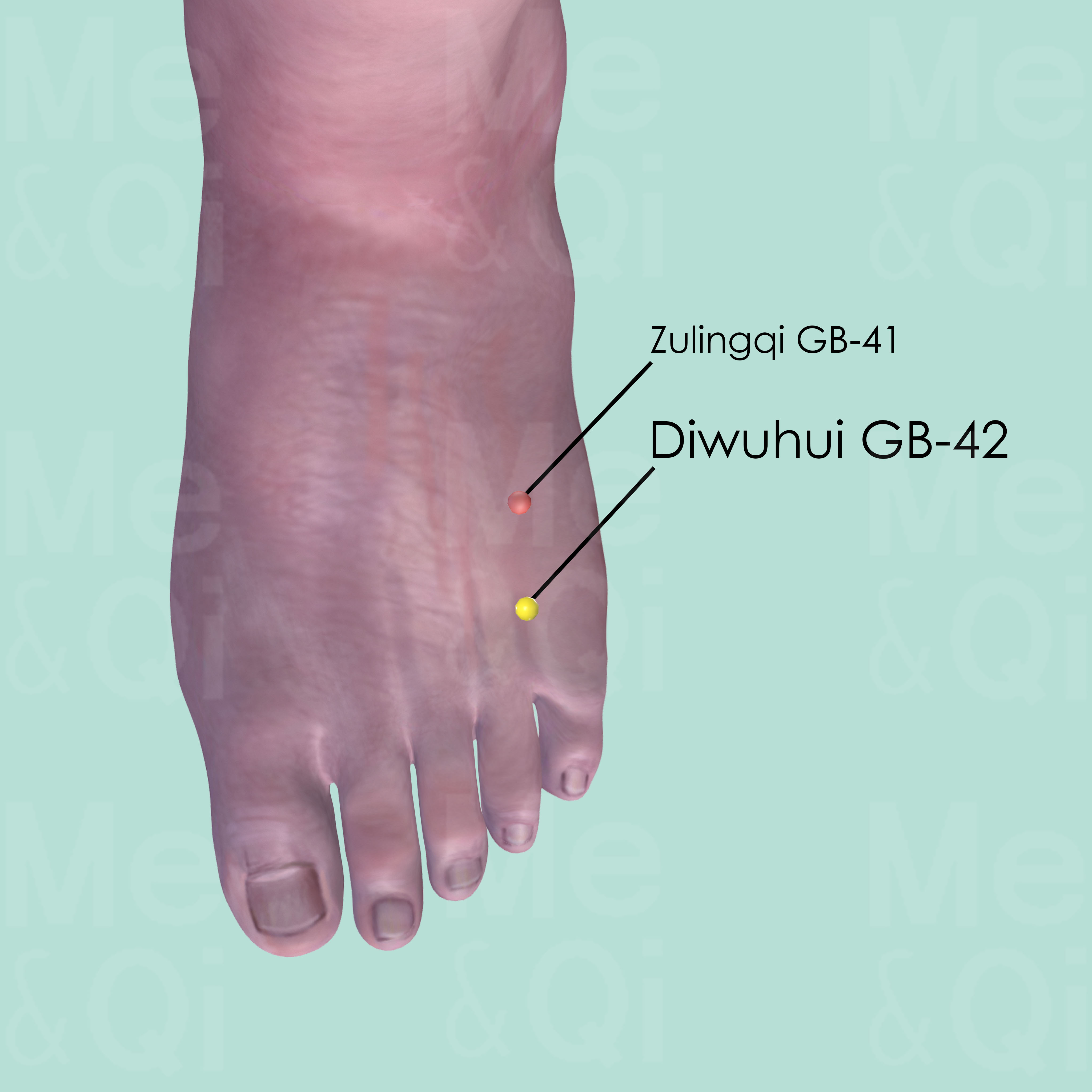
Diwuhui GB-42
Between the 4th and 5th metatarsal bones, on the medial side of the tendon of extensor digitorum longus muscle of the little toe.
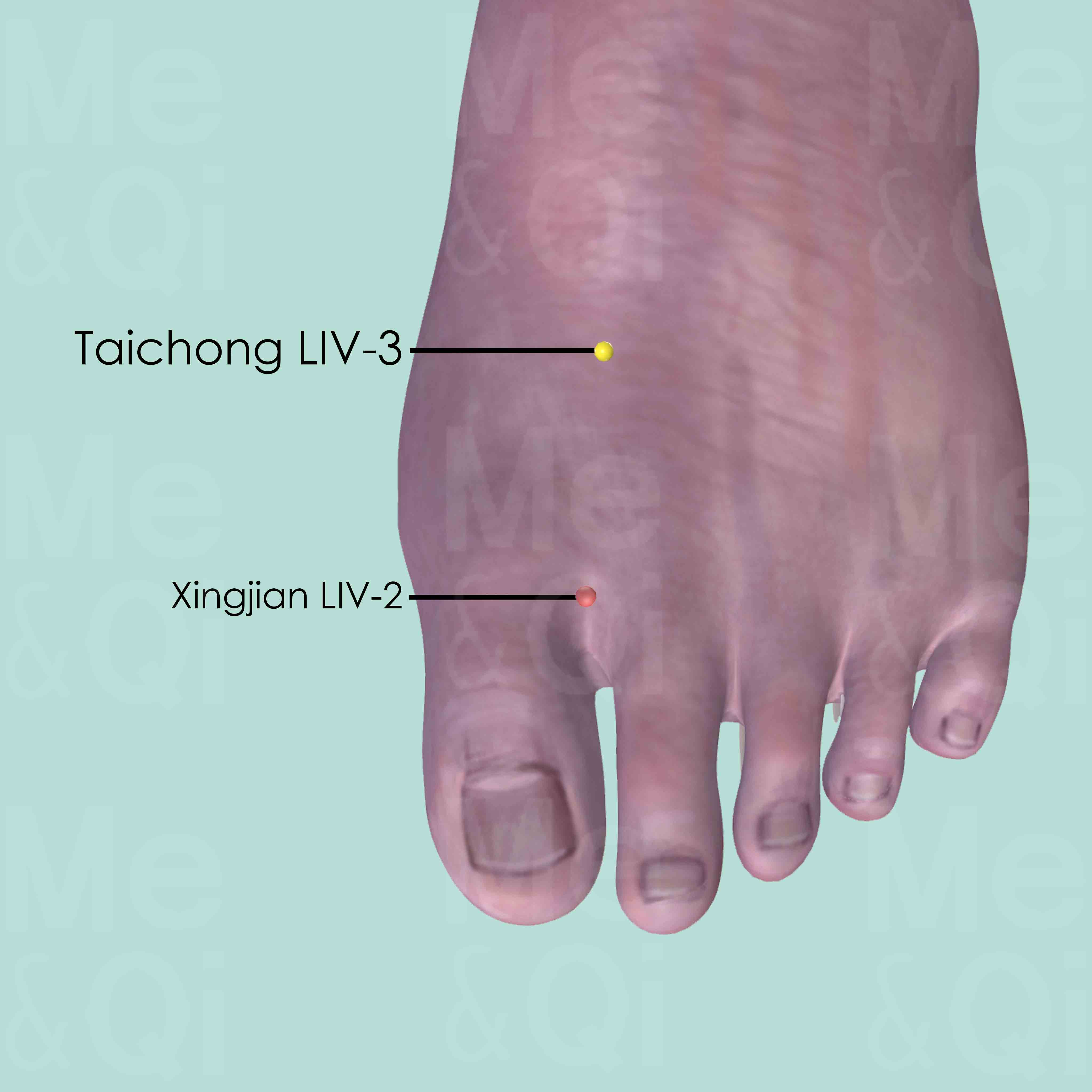
Taichong LIV-3
On the dorsum of the foot, between the 1st and 2nd metatarsal bones, in the depression proximal to the metatarsophalangeal joints and the proximal angle between the two bones.
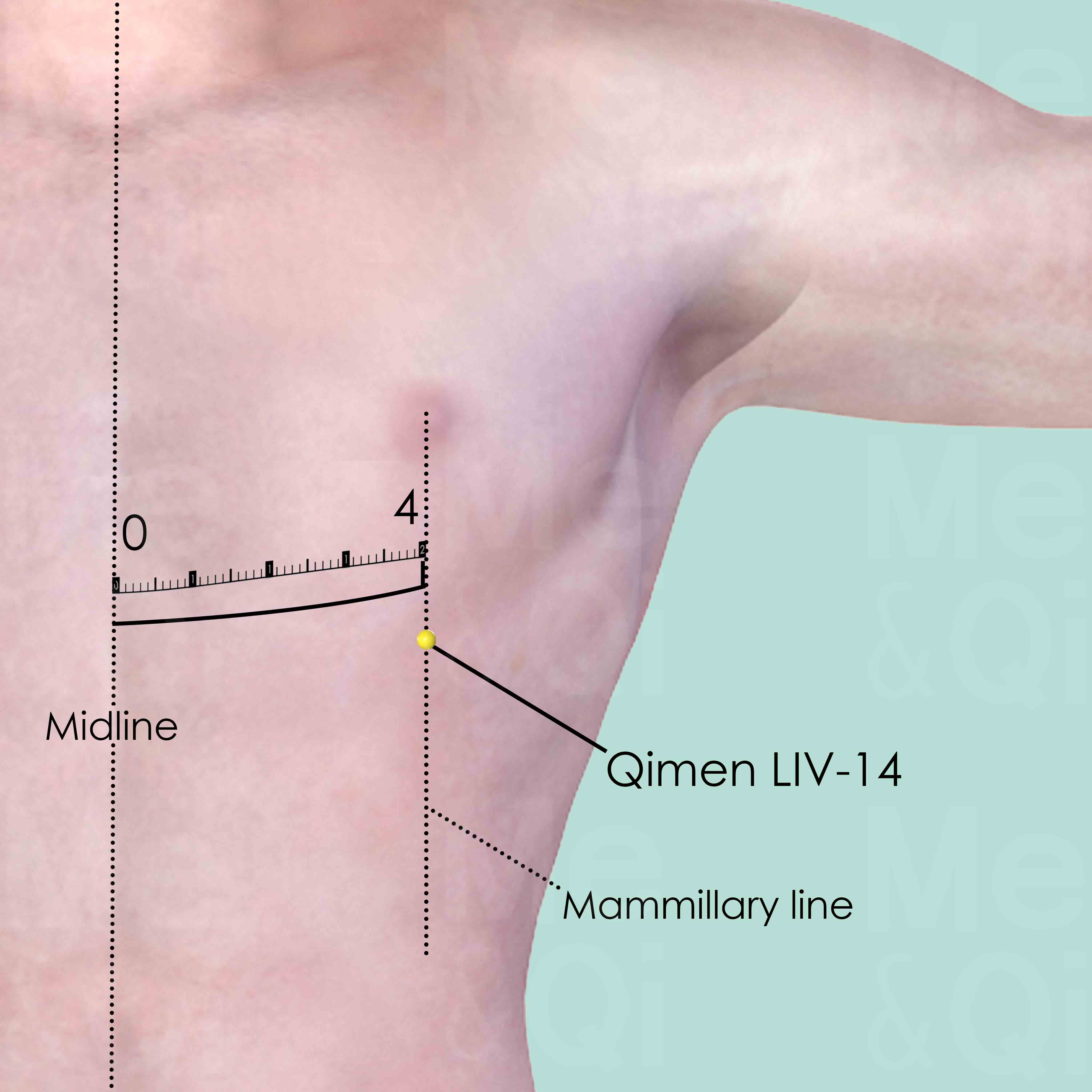
Qimen LIV-14
On the mammillary line, two ribs below the nipple, in the 6th intercostal space, 4 cun lateral to the midline. Please note that there is an alternative location for LIV-14 at the lower edge of the ribcage in line with the nipple or, in women, 4 cun from the midline. In fact, one could look upon these as two separate points. The one in the intercostal space is used more for Channel problems. While the one at the lower edge of the ribcage is used more for Organ problems.
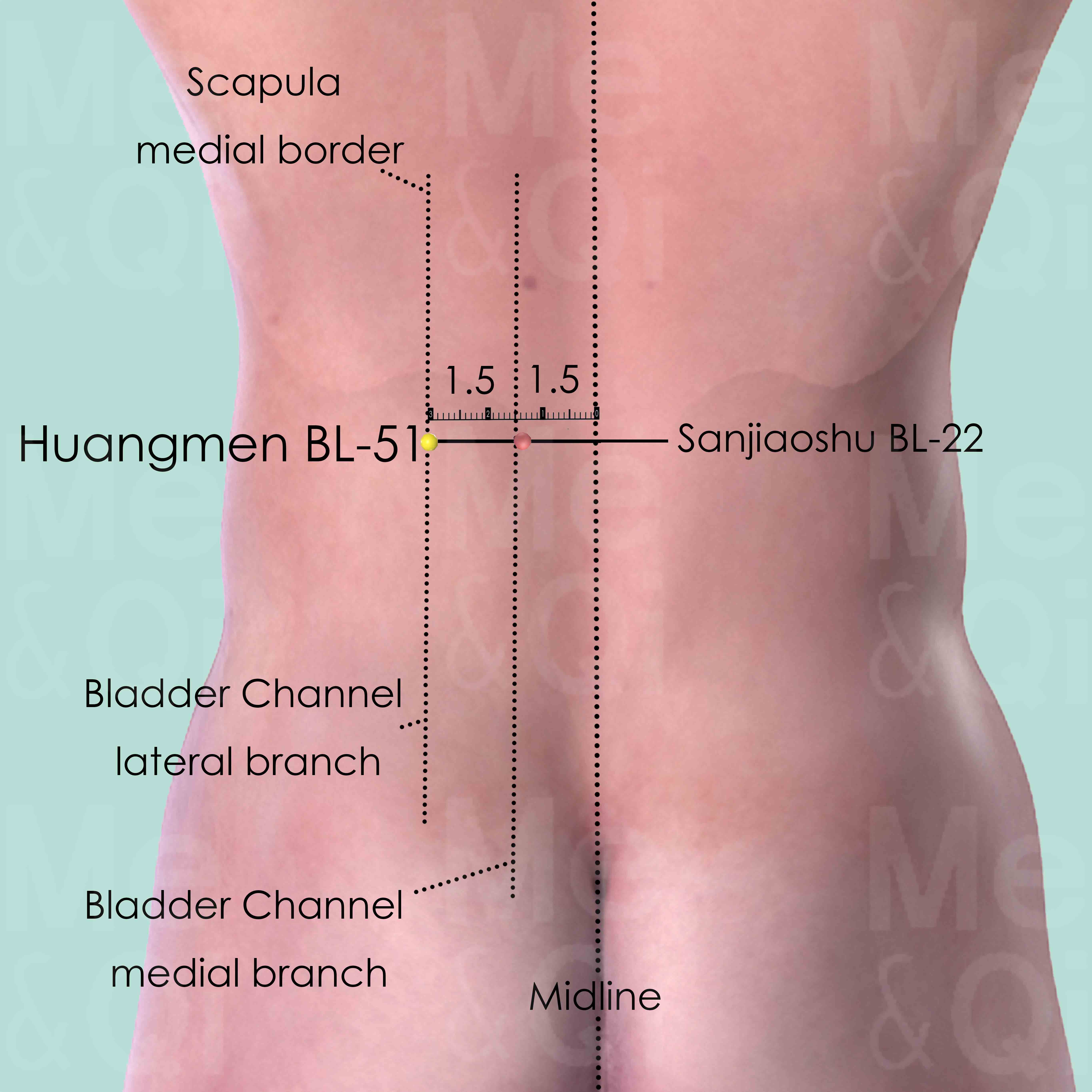
Huangmen BL-51
3 cun lateral to the lower border of the spinous process of the 1st lumbar vertebra (L1).
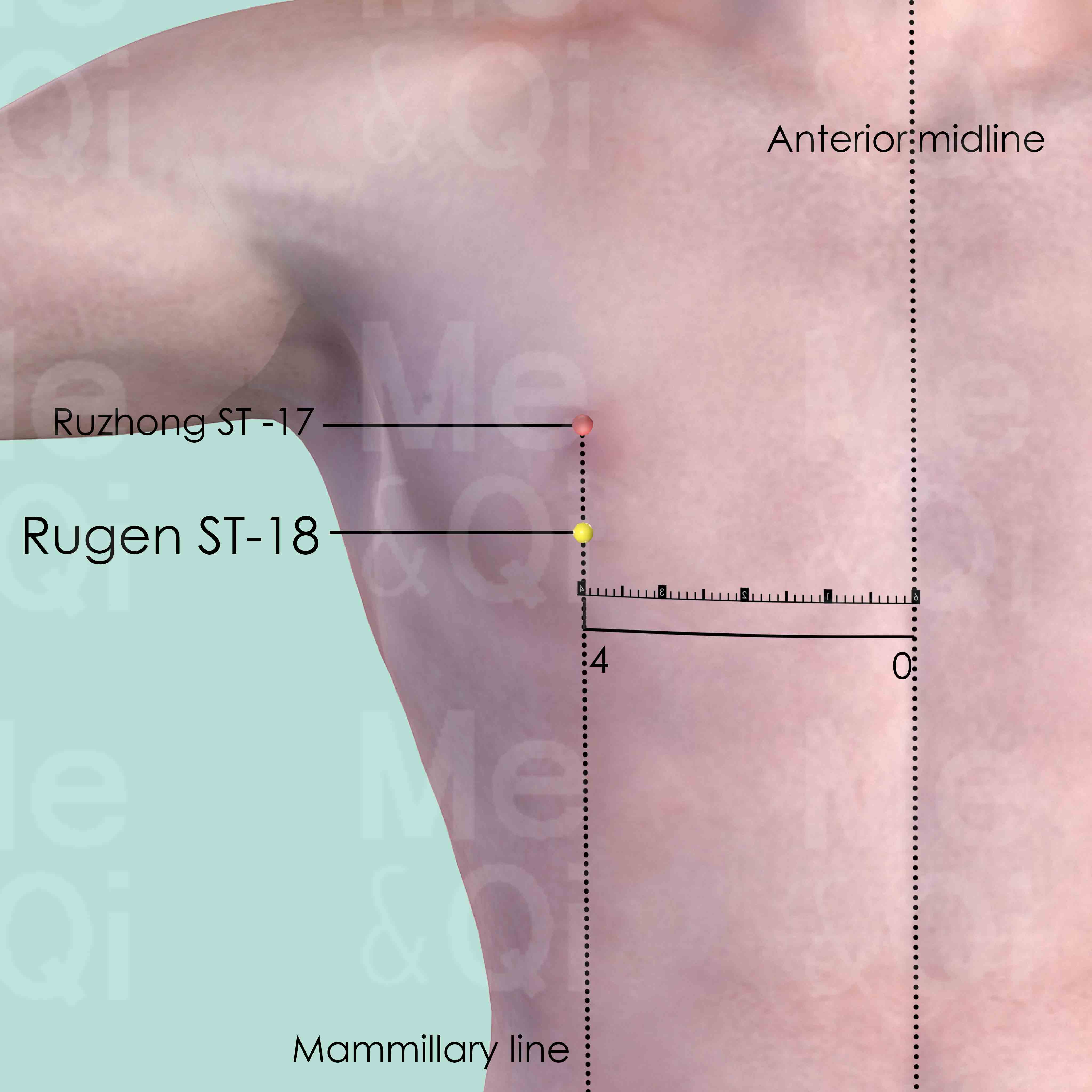
Rugen ST-18
In the 5nd intercostal space, on the mammillary line, 4 cun lateral to the anterior midline.
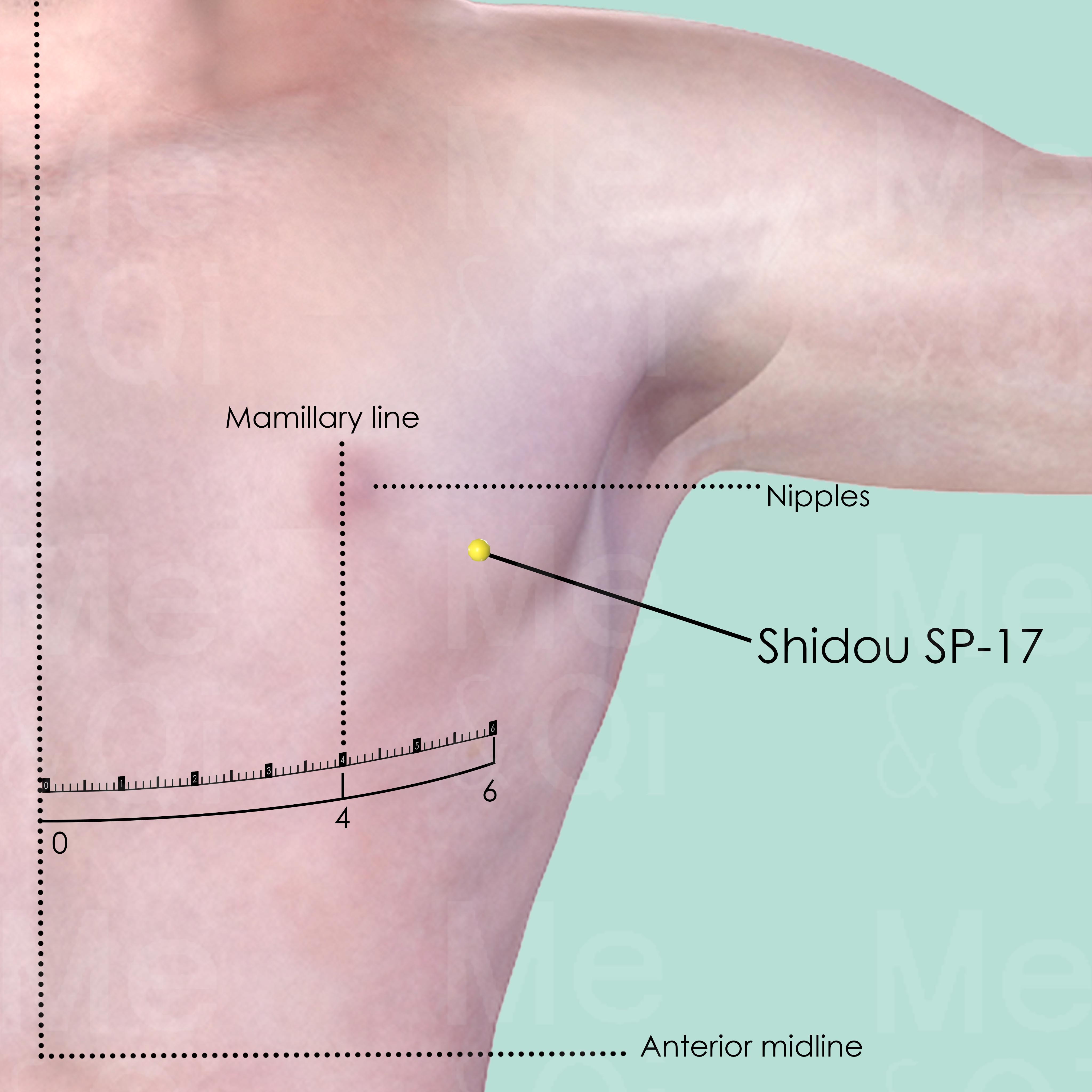
Shidou SP-17
6 cun lateral to the anterior midline, 2 cun lateral to the mamillary line, in the 5th intercostal space.

